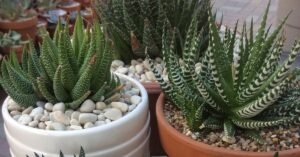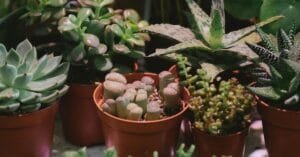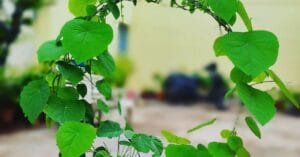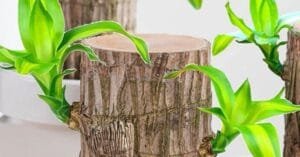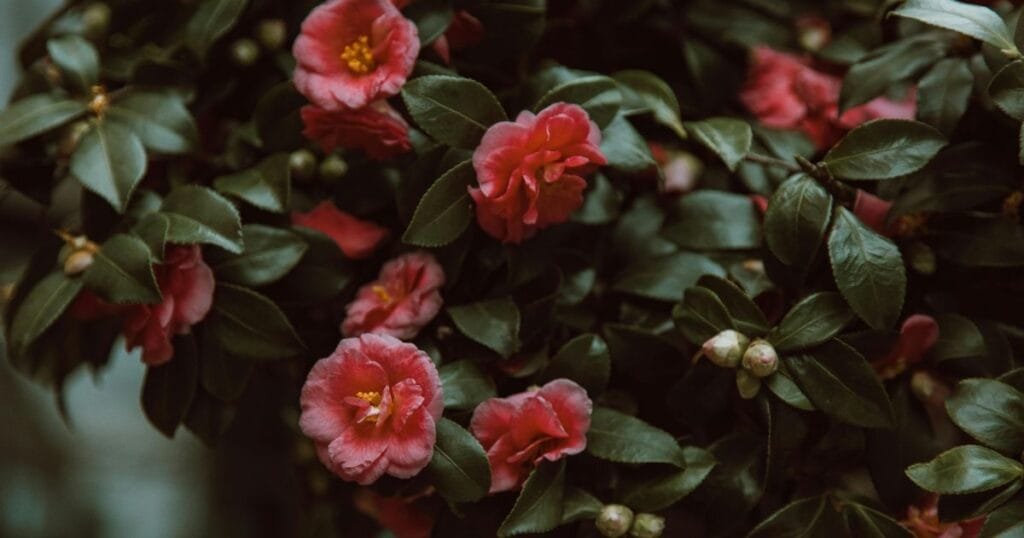
Camellia plants are beautiful flowering plants that thrive indoors and outdoors. Their bright flowers enhance the look of your home and mesmerize you with their scent.
Camellia plants can bloom flowers throughout the year with proper care and nourishment. But to get such an amazing setup, you have to know more about this plant. We have discussed a few details that may help you nurture the plant.
Facts About Camellia Plants
Camellia is a tropical flowering plant that comes from Theaceae family. It is often categorized as a shrub or a smaller-sized tree. This indoor flowering plant blooms a beautiful variety of Camellias. The flowers are vibrant and amazing. The best thing about this plant is that it can blossom flowers throughout the year with proper care. The best times, that Camellias actively bloom are during fall and winter. Yet, it can survive the later seasons of the year with care.
It should not only be the flowers on the plant that are noticed. Even its evergreen foliage compliments it greatly. The leaves are glossy and suggest luxury. Overall, it is best to nurture it with ease.
| Scientific Name | Camellia |
| Species | 220+ |
| Soil Type | Well Drained Acidic Soil |
| Blooming Season | October to May (Northern Hemisphere) March to October (Southern Hemisphere) |
| Common Name of Camellia In India | Chaya, Chaha, Chaikapatta, Thaeyilai, and Tea Gida |
| Pet friendly | Yes |
Varieties of Camellia Plants in India(H2)
Camellia Plants are fragrant flowering plants. It has over 220+ species all over the world. And, below are a few of its variants that can easily thrive in the Indian climate throughout the year.
April Dawn Camellia
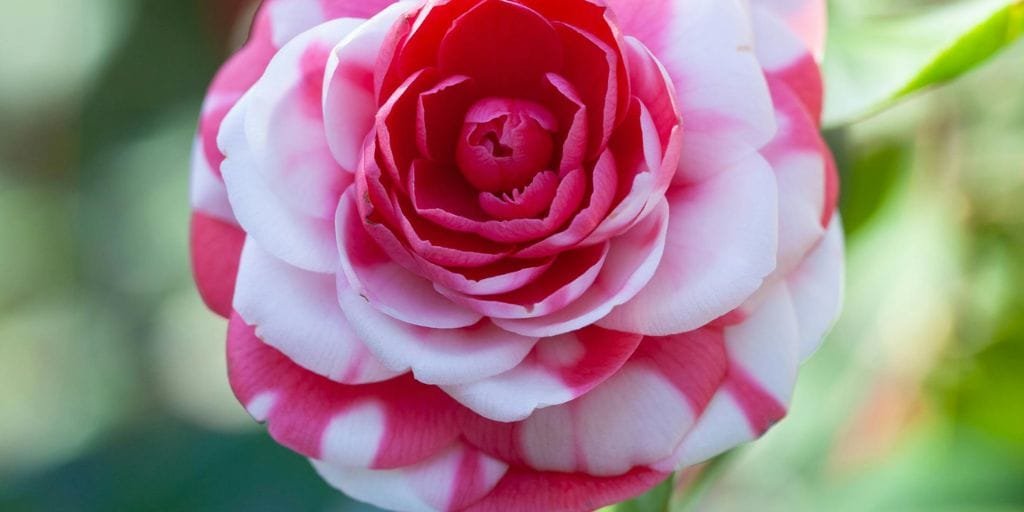
April Dawn Camellia, or Japanese Camellia, is a native of Japan. Yet, it is easily available in India as it thrives in its climatic conditions. The peak time for it is in April. It can grow up to a size of 6 to 12 feet tall and 4 feet wide. It has white flowers with a hint of pink. It is best to grow the plant in a slightly shady area as it requires minimum lighting.
Australis Camellia
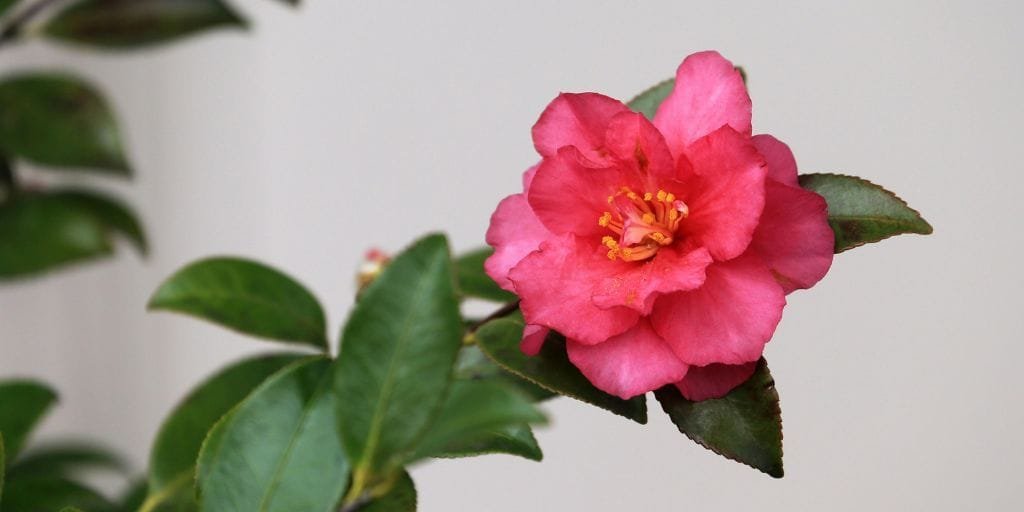
Australis Camellia is a slow and steady-growing shrub. It is best from January to March in the Northern Hemisphere and June to August in the Southern Hemisphere. With an average size of 8-12 feet tall and 5-8 feet wide, it makes one of the most attractive-looking Camellias. This variant blossoms bright reddish-pink flowers.
Ballet In Pink
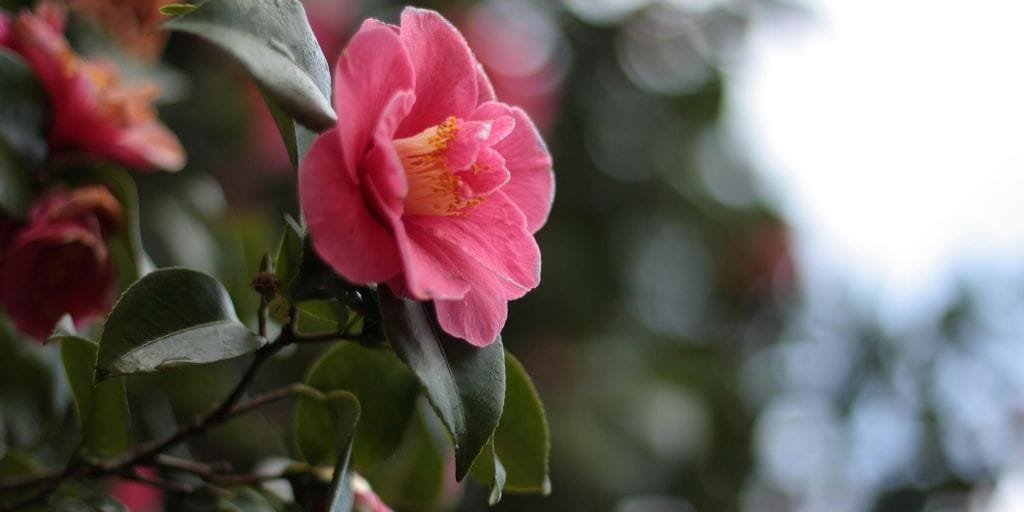
Camellia x Williamsii or Ballet in Pink is quite an interesting Camellia houseplant. The flowers on this plant open sling the stems at each of the nodes. Its orchid-pink color flowers look magnificent. Generally, it blooms around the late winter to mid-spring season. It can be as large as 4 to 5 feet on average.
Camellia Black Lace
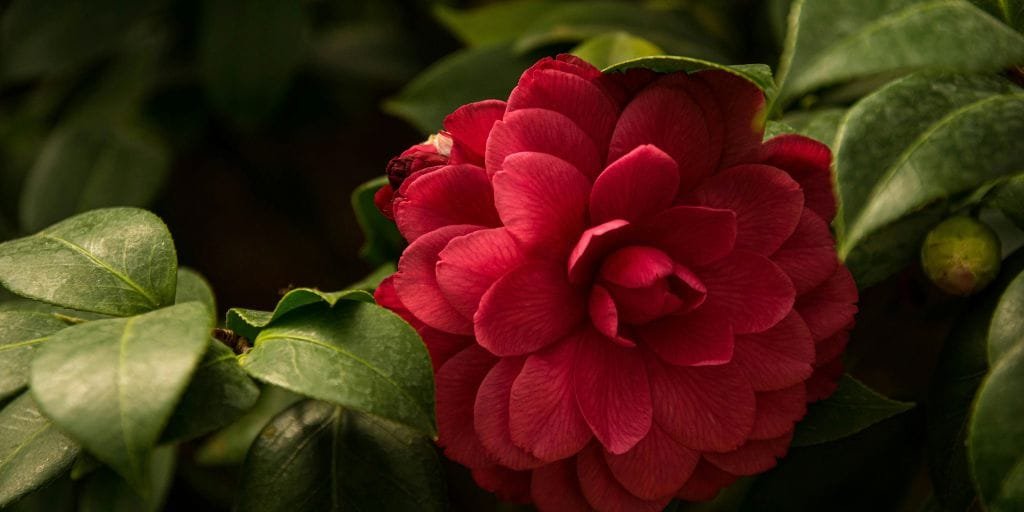
Camellia Black Lace is a compact shrub that grows in the upright direction. It is a tall and beautiful-looking tree. The name Camellia Black Lace has been given to this shrub because of its dark green color leaves and dark blackish red color flowers. It spreads amazing fragrance all over. It can grow up to a height of 8-12 feet which is quite tall for a shrub.
Camellia Black Magic
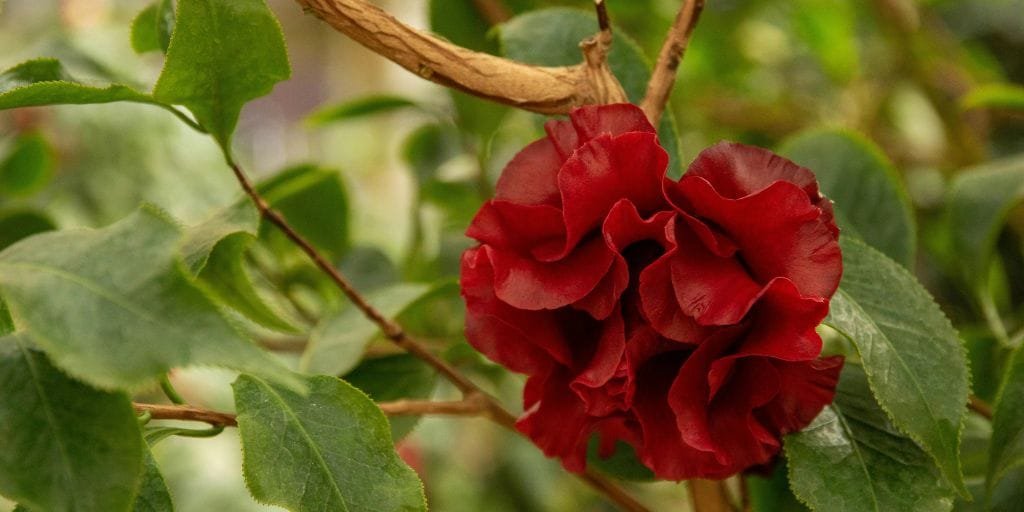
Camellia Black Magic is a large and deep blackish-red color camellia. The nodes of this variant are quite open and wide. Even the petals and foliage are glossy. These variants can grow in shady to full-shady areas. With a height of 8 to 12 feet tall and 6 to 10 feet wide. To reach its mature stage/height it takes about 10-20 years.
Bonnie Marie
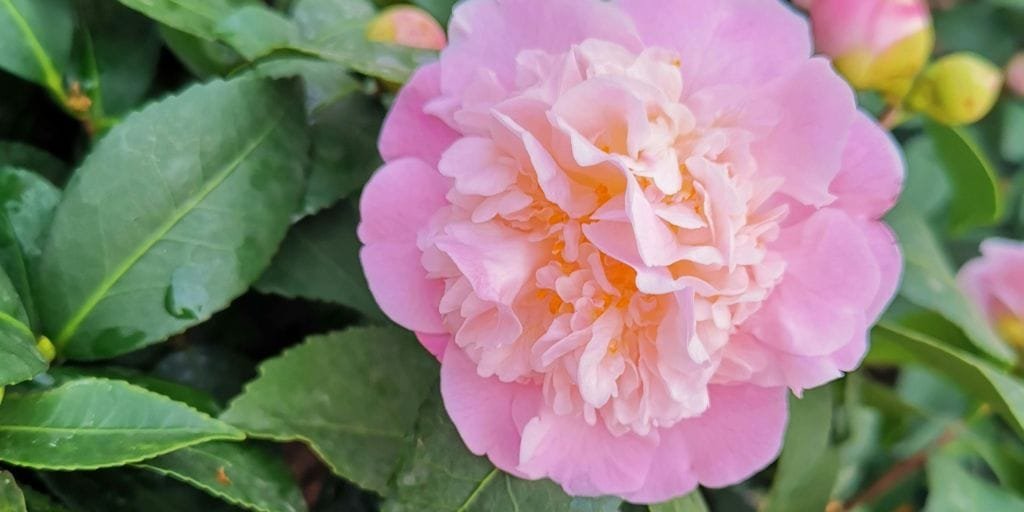
Camellia ‘Bonnie Marie’ is a large, semi-souble form of Camellia. The petals are quite wide which roughly measures around 7-10 cm. These pinkish petals have a deep reddish stamen in the middle. The peak season for it is November to April. The size of this shrub extends between 8-10 feet tall and 6-8 feet wide.
Camellia White
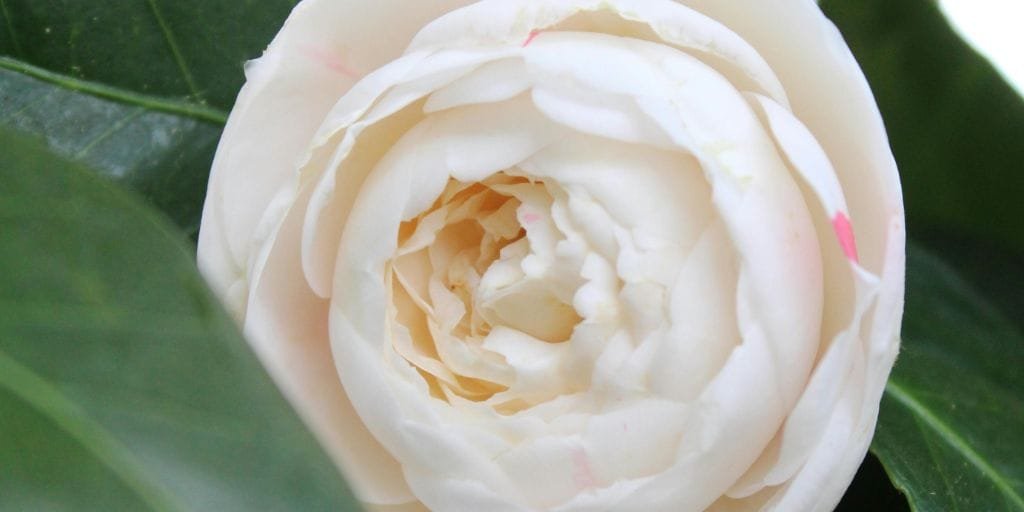
Camellia white is a beautiful white flowering plant that symbolizes purity and innocence. This variant is seen in weddings as it resonates with good vibes. It is a great option for indoors. These can grow up to a height of 10 ft tall and 6 ft wide. They are often confused with white roses.
Camellia Red
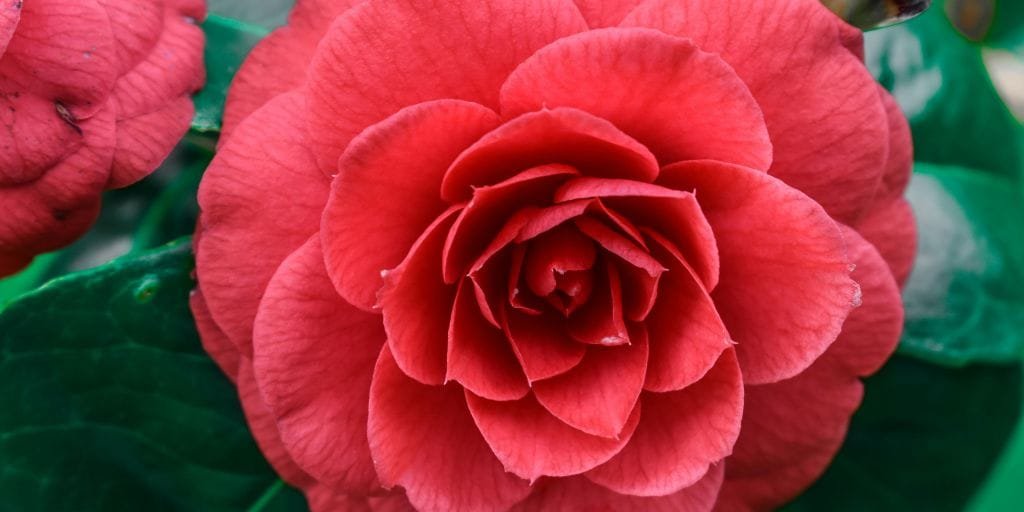
Camellia Red or Camellia Japonica is a beautiful red Camellia plant. It is an air-layered-bushy plant. It is easy to take care of. The flowers are approximately lasts for 1 month in the peak time. If taken care of properly then the frequency of flowering is a year or so. The size of this plant is around 2 ft.
Camellia Pink
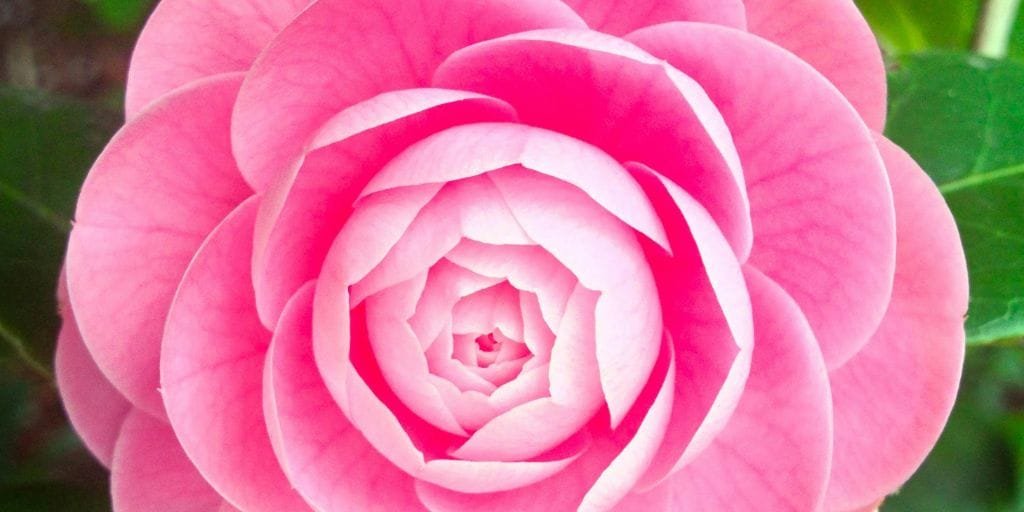
Camellia Pink is a rare pink variant that comes from Japan. It generally blooms in the later winter to early spring reason. Even though it is a rare plant, it is easily available in India. The size can range between 3-5 feet.
Benefits of Buying Camellia Plants
Long-Lasting Blooms
Camellia is a flowering plant that has amazing blossoms throughout the year. In the peak seasons, the flowers are long-lasting and vibrant. It spreads a mesmerizing scent in the overall region. The blossoms come in various vibrant colors like red, pink, white, yellow, and many more. It adds a lot of depth to the palace where it is set up.
Low-Maintenance Quality
Even though Camellia is a flowering plant, it is a hassle-free plant. It is great for any beginner or an experienced gardener. This easy-going plant is great since the only requirement for it is acidic soil. And also a moderate watering cycle. Other than that, it is great to handle both indoors and outdoors.
Blossom Forth
Camellia plants are shrubs that come with a magical advantage. Unlike, the other flowering plants, Camellia can blossom all year round. This adds up a lot to the magaing factor of the shrub. With proper care and nourishment, you get amazing blossom. And, during the peak seasons of each variant, you get the most astonishing sight of everything.
Air Purification
Like other houseplants, Camellia houseplants can also contribute a lot to air purification. Indoor plants are the best source of generating fresh and clean air. It helps you breathe non-toxic air that you can be beneficial for your health. Since Camellia plants are flowering plants, you not only get fresh air to breathe. But also get to smell the sweet note of the flowers every time you take a deep breath.
Symbolism
Camellia plants symbolize love, affection, and admiration in one’s life. But, it also carries cultural significance as well. Camellia has around 220+ species around the world. Therefore, in many parts of the world, it carries different cultural importance. For example, in Japan, they symbolize longevity, beauty, and nobility. Also in China, they are well known as a symbolic representation of good fortune and prosperity.
Pests and Disease
Camillas are least prone to any sort of pests and diseases. Therefore, making it a great choice for people with tight schedules. This is the reason for it being a low-maintenance plant.
Caring Tips For Camillia Plants
1. Water is only about 10 cm down. Twice a week of watering is enough for the plant’s growth. Overwatering is strictly prohibited.
2. Shred off the deadheads of the plant. Removing the dead flowers will automatically clear out a lot of space for new and healthy growth.
3. The Camellias grow best in acidic soil.
4. Camellias love bright shady sunlight. Direct sunlight may damage the leaves and flowers.
5. Potting and repotting can be practiced to remove the toxicity if any. Even hydrated soil should be replaced. Since Camellias are slow growers, it does not require often repotting.
Camellia is a famous plant worldwide. It is a great indoor and outdoor plant. Because of its low maintenance quality, it is a great option for gardeners. If you are looking for some options for it, then kindly check out Plantzone.
FAQs
Do Camellia plants love sunlight?
Ans: Camellias are not a great lover of bright and harsh sunlight. But, it works great in full shade.
Can we grow Camellias on a pot?
Ans: Camellias can easily grow in pots. But remember to maintain a distinct size while planting. Too large a plant may not fit into a pot.
What is the average lifespan of Camellia?
Ans: Camellias can grow throughout the year. Thus, making it a great evergreen plant. On average, it can grow up to 100 to 200 years. The oldest Camellia plant has been found in China’s Panlong Monastery which was planted in the year 1347.
Is Camellia a slow grower?
Ans: Camellia is a slow and steady grower. It is best to maintain such plants.








